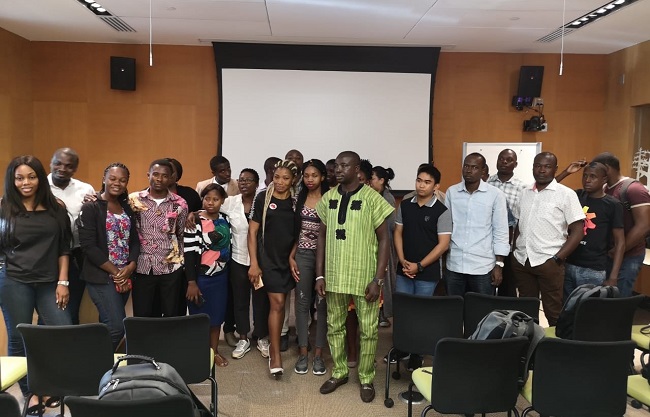The Ronald Lynch Dean of the College of Agriculture and Life Sciences (CALS) at Cornell University, Dr. Kathryn Boor, has spurred the 2018 Cornell Alliance for Science Global Leadership Fellows to think of how to contribute towards addressing the challenges bedeviling food security and extreme poverty around the globe.

Dr. Boor urged the 29 new cohort representing nine different countries at a reception held in the University’s main campus in Ithaca, New York while welcoming them into the Cornell community.
She told the team that CALS is established with the clear objective of helping to transform and making the world more habitable and sustainable.
“Our mission here in CALS is to leave the world a better place than we found it,” she said. “And we pour our hearts in trying to achieve this.”
This goal, according to her, has become more important particularly now that the world’s population is projected to surpass over nine billion people by the middle of this century.
She hinted that CALS is working closely with communities across the State of New York and around the world through life changing research, teaching as well as extension service to improve agriculture, food security, health and general well-being as part of efforts to tackle some of the aforementioned predicaments.
The Dean added that researchers in her College are also collaborating across disciplines and multiple areas to mitigate challenges and explore opportunities of relevance to solve some of these complicated and complex problems affecting not just New York as a city but the entire global community.
Part of this research efforts, she explained, includes finding solutions to global challenges such as reducing the consequences of climate change, enabling food security, providing sustainable energy options and understanding how to harness new tools of social media to improve science communication.
Dr. Boor disclosed that CALS international programmes, which include the Alliance for Science, are building more than 100 years of partnerships to improve food systems around the globe.
Looking into the future and predicting the next decade or two, the Cornell CALS’ chief asserts that food security and development related issues are going to increasingly dominate and shape global communities and business leaders.
She expressed concern that only few institutions in the world are better equipped than Cornell CALS to address many of the scientific and technical problems that threaten food security across the world.
The Dean submitted that agricultural transformation must be taken seriously if the global dialogue about ending extreme hunger and poverty is to be achieved.
Okon Unung from Nigeria, a Plant Breeding specialist and a 2018 Global Fellow of Cornell Alliance for Science, said that he is passionate about improving the quality of lives globally by contributing significantly to making sure that everyone around the world has equal access to sufficient, nutritious and safe food at all times to meet their dietary needs.
“As a plant breeder, one of the hallmarks of agriculture is making the right crop varieties that are commensurate with the emerging agricultural dynamics available to farmers because agricultural production system is challenged with numerous factors such as pest and diseases, the incidences of climate change reflected in drought condition and flooding, as well as other biotic and abiotic stresses that has become major challenges,” Unung said at a sideline of the reception.
The target and responsibility of every plant specialist, according to him, is to see how to develop appropriate crop varieties that can suit and meet with the emerging dynamics of agricultural production systems.
Unung disclosed that he was motivated to join the Global Leadership Fellows of Cornell Alliance for Science to boost his capacity as a scientist to demystify the complex science of biotechnology to the knowledge level of farmers to enable them access agricultural innovations and novel research outcomes of agricultural biotechnology to improve their productivity.
“This fellowship will put me in a better pedestal for effective extension service delivery considering that I have worked with farmers through extension programs for many years,” he said. “It will also help me to strategically communicate scientific innovations to the knowledge level of farmers and intended beneficiaries through effective extension programming and science communication.”
The Cornell Alliance for Science seeks to promote access to scientific innovation as a means to ensure global access to life-improving agricultural innovations that can shrink farming’s footprint, deliver food security, reduce the drudgery of field work that often falls on women and children, provide rural families with sufficient income to educate their children, and inspire young people to pursue a career in agriculture and science.
The GFLP welcomed its first cohort in 2015. With 25 graduated fellows in 2015 and 28 graduated fellows in 2016, GFLP fellows represent a total of 20 countries across South and Southeast Asia, Latin America and sub-Saharan Africa, as well as the United States.
The fellows, who are currently undergoing training in strategic planning, grassroots organising, the science of crop biotechnology and effective communications, are expected to return back to their respective countries upon completion of the programme and become advocates of “evidence-based” decisions on global sustainability and agricultural affairs.
By Etta Michael Bisong, New York
